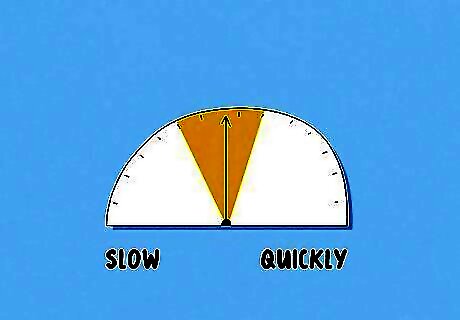
views
Improving Your Diction

Try tongue twisters. Tongue twisters are a great way to improve your speech clarity as mastering them will allow you learn how to keep your voice clear and speak with confidence. Many actors and public speakers will practice tongue twisters before going on stage to warm their voices up. Start off slowly and gradually build up until you can say them at a normal conversational speed. When speaking them, exaggerate the words, making your tongue, jaw, and lips work hard. As you become surer of them, begin to project your voice and exaggerate the words more. This helps you gain skill and strengthens the muscles in your mouth for speech. Try some of these tongue twisters to improve your speech clarity: You know New York, you need New York, you know you need unique New York. (Repeat). Red leather, yellow leather. (Repeat). While we were walking, we were watching window washers wash Washington's windows with warm washing water.

Read aloud. If you're reading a book or even just the news in the morning, practice reading it out loud. Doing this will help you become more familiar with how you sound when you speak. Oftentimes when we are talking to people we aren't really listening to ourselves and how we sound. By reading something out loud in the comfort of your own home you can begin to listen to yourself and pay attention to areas where you may not speak clearly. You can also record yourself talking and then play it back while taking note of where you may mumble or not speak clearly.

Practice speaking with a cork in your mouth. Many actors and voice actors do this exercise to increase clarity and diction, especially when it comes to something like Shakespeare.By putting a cork between your teeth and speaking aloud you train your mouth to work extra hard to really pronounce every syllable, and the cork will also prevent your tongue from tripping you up on certain words. This exercise can tire your jaw, which will help you learn to relax it, but you shouldn't do this for too long so you don't get sore. You may also want to have a napkin with you as you produce a lot of saliva with this method.

Pay attention to tone. Tone also plays into clarity and diction as it can affect how you pronounce certain words. Are you giving a speech that is supposed to excite people? They may have a harder time understanding you if you are monotone or disinterested. Your tone, whether you're excited, informative, or conversational will affect how people pay attention to your speech, and can improve your clarity. Tone is everything from your attitude when speaking to the pitch of your voice. Take note of how high or low your voice is when speaking.

Avoid uptalk. Uptalk is that nasty habit of ending your sentences with an upward inflection that makes you sound like you're asking a question. End your sentences on a strong note with authority. Speak with declarative statements and invoke confidence. A lot of times uptalk happens when we don't feel confident in what we are saying. Maybe someone asks you what you do and you respond with “I'm a designer?” This is uptalk and it makes you sound almost apologetic. Instead, own your response and statements. “I'm a designer.”
Taking Your Time While Speaking

Don't rush when speaking. Talk deliberately, but not so slow that you sound like a robot. Oftentimes, speaking in public can make people nervous. If you find yourself nervous and rushing, try to remember that it's ok to slow down. If you are breathing correctly this will help you stay calm and parse out your words. Also keep in mind that people want to hear what you have to say. Your words have value, so give them a chance to hear them. The human ear can pick up on a lot very quickly but by making sure that you finish each word completely before starting the next one, you'll create enough space between words so that everyone can understand you properly.

Control your breath. Listen to a singer or watch him on stage and you'll see how much he pays attention to his breathing. Mick Jagger wouldn't be able to run up and down a stage while belting “You Can't Always Get What You Want” if he didn't know how to breathe properly. The same goes for speaking, and proper breathing can greatly improve your speech clarity. One way to ensure that you're getting proper breaths is to put one hand on your belly and one on your chest while breathing. You want the hand on your belly to move while your chest stays in place. Breathing with your belly ensures that you get a true full breath that will allow you speak with a full voice. Speak at the top of your breath. Once you've inhaled properly, begin speaking and think about your words as your breath slowly and steadily leaves you. This allows your breath to support your words and will allow you to naturally take your time.

Swallow excess saliva. Saliva left in the mouth can result in mumbling and distortion of consonants such as "S" and "K". Taking a moment to swallow will not only keep your mouth clear, but it will give you time to pause and breathe again. Take a moment to swallow when you finish a sentence or thought, not during the middle of a sentence. This will also give you a moment to prepare what you're going to say next.

Know what you are going to say. Whether you're giving a public speech or just having a casual conversation with a friend, taking at least a moment before speaking to know what you are going to say will help you speak with clarity and prevent you from talking too fast. Clarity isn't just about forming words properly, it's also about getting your message or point of view out as precisely as possible. Oftentimes this means knowing what you want to say so you don't have to backtrack or fill in your sentences with “um”, “like”, or “uh”.

Walk it out. If you have to speak publicly and are giving a presentation of some kind you have probably written down at least an outline of your speech. Practice your speech while walking around. Some actors will use this method to memorize their lines, as getting up and moving can help you remember what you need to say. Practice your speech and say one word for every step you take. This may seem arduous and slow, but by taking one step for every word you'll learn to slow down. You don't have to speak this slowly in your speech or normal conversations but being able to feel comfortable going at a slower pace will improve your speech clarity and allow you to further take your time.

Repeat words that are hard to say. When we have a hard time pronouncing certain words we often speed up and try to stumble through them resulting in muddled speech. Practice saying these words aloud over and over again until you build the muscle memory to pronounce them correctly. Words like “Squirrel”, “Brewery”, “Phenomenon”, and “February” are considered some of the hardest words to pronounce in the English language because they may be spelled unlike they sound. To help you learn to pronounce difficult words try spelling the words out phonetically. Once you feel comfortable with trouble words you will be able to speak with confidence and take your time.
Exercising Your Muscles

Practice jaw exercises to enhance clarity of speech. Relax your jaw to make your speech a lot clearer with some exercises. Make wide chewing motions while humming gently. Stretch every muscle in your jaw and face. Open your mouth as wide as possible (as if you were about to yawn), while moving your jaw in circles, and sideways. Open your mouth wide, as in the previous exercise, and shut it again. Repeat 5 times. Make a buzzing sound with your lips together, but don't clench your jaw.

Watch your posture. Just like breathing, your posture plays a large role in your speech clarity, and it's something that we sometimes forget to take into account. For best speech clarity you should stand straight with your shoulders back and your weight evenly distributed. Do some shoulder rolls and standing side bends to help with your posture.These simple exercises will also help you with your breathing, and you can even do your jaw strengthening techniques while you stretch. EXPERT TIP Stephanie Jeret Stephanie Jeret Speech-Language Pathologist Stephanie Jeret is a Speech-Language Pathologist based in Northeastern Illinois. She works with children who stutter, have receptive/expressive language difficulties, and have articulation disorders/delays. She also works with adults who present with dysarthria, apraxia, aphasia, executive function disorder, and stuttering. She is certified by the American Speech-Language and Hearing Association (ASHA) and received their ACE Award for excellence in continuing education. She is also PROMPT Bridge Trained, Lidcombe Trained, and Lee Silverman Voice Therapy Certified. Stephanie holds a Bachelor of Arts degree from Queens College and a Master of Science in Speech-Language Pathology from Brooklyn College. Stephanie Jeret Stephanie Jeret Speech-Language Pathologist Use a mirror to check mouth positioning and help articulate sounds clearly. Using a mirror during speech therapy lets you check your mouth's positioning, which can help with articulation disorders. For lisps, you can see if your tongue is in the right spot. For "b" sounds, you can check your lips are closed. Seeing yourself helps make sure you're accurately saying sounds, improving clarity.

Warm your vocal chords. Doing vocal warmups will loosen you up and prepare your voice so you can speak clearly and effectively. Even if you're not singing, you can do some scales or just hum. Try singing your tongue twisters too. Do some “Whooos!” going up and down. Picture your voice like a ferris wheel going round and round. Hum and pat your chest. This can help knock out any phlegm you may have.

Avoid speaking with clenched teeth. When you clench your teeth you're causing a lot of strain on yourself and it can be a sign of stress. And speaking with a clenched jaw will prevent you from opening your mouth enough to enunciate and speak clearly. If you find yourself clenching your jaw, practice some of the warmups, and take a moment to take a deep breath slowly exhaling by letting your breath buff your cheeks out, as if you're letting air out of a balloon.

Stay hydrated. Your vocal chords are like a machine that needs to stay well oiled. Gargle some lukewarm water with a pinch of salt to keep them limber. This helps relieve tension in the throat.



















Comments
0 comment